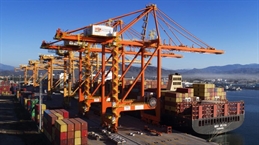
Contecon Manzanillo S.A. de C.V. (Contecon Manzanillo), a business unit of International Container Terminal Services, Inc. (ICTSI) and concessionaire of the Specialized Container Terminal of the North Zone of the Port of Manzanillo (TEC-II), is the first organization across the Mexican port industry to be certified carbon neutral.
In a statement, ICTSI noted that the Carbon Neutrality UNE-14064-3:2019 certification recognizes Contecon Manzanillo's commitment to global initiatives to combat climate change, promote renewable energy and decarbonize ports and maritime transport.
It added that earning this distinction favouring the environment consolidates Contecon's leadership as a vanguard port terminal in favour of Manzanillo, Colima and Mexico.
The announcement explained that the carbon neutrality certificate highlights the company's efforts to offset greenhouse gas (GHG) emissions through reduction and compensation practices.
These efforts include counteracting and maintaining zero emission from equipment such as cranes, port tractors, air conditioners and other polluting sources; compensating for emissions through sponsorships of forests and protected areas; and initiating sustainable initiatives like the execution of circular economies and incorporation of technologies that reduce the operational impact of the Port of Manzanillo – the primary port in the Mexican Pacific.
José Antonio Contreras, Contecon Manzanillo chief executive officer, said the certification's relevant not only for Mexico's port sector but also for industrial activity in general.
"We are proud to be the first terminal in Mexico verified under this regulation. At Contecon, we are quite clear about maintaining an agenda aligned with our business in which climate change is combated, and the use of renewable energy is encouraged," he said, adding that, more importantly, the port is moving firmly towards the decarbonization of ports and maritime transport of Mexico.
"Having this type of certification portrays us as an organization that demonstrates commitment, talent and a real position for change in the face of environmental problems," Contreras said.
ICTSI said in its announcement that passing the audit performed by TÜV RHEINLAND, Contecon Manzanillo demonstrated its ability to adequately reduce its greenhouse gas emissions and move forward in a timely manner towards an energy transition across Mexico's maritime transport.
In 2021, the company's direct and indirect CO2e emissions amounted to 25,368.67 tons, while total offset emissions amounted to 25,369 tons.
"We recognize Contecon Manzanillo's vision and leadership in the industry by maintaining its operations in constant improvement since being awarded previous certifications for its management system, and now voluntarily submitting to verification by TÜV Rheinland of Mexico for its greenhouse gas emissions generated in 2021 and the neutralization process that was carried out. Granting this certification is a historic event for Contecon Manzanillo," said Hermann Saenger, TÜV Rheinland de Mexico country manager.
"At TÜV Rheinland de México, we are proud to have collaborated with them in their journey to become the first port terminal in Mexico to obtain the carbon neutral certification," Saenger added.
The statement noted that based on the study "Energy Transition of Maritime Transport: Strategic Opportunities in Mexico," conducted by the Global Maritime Forum and the University College London, regional and global maritime transport effectively connects economies through the movement of goods and currently represents between 80% and 90% of world trade.
The shipping sector emits 2%-3% of global GHG emissions and contributes around 13% of sulfur and nitrogen oxide emissions to global air pollution. Hence the urgency and commitment to undertake a transformation of the port industry towards increasingly sustainable practices.
Contreras noted that the transition of fuel in maritime transport and the commitment of more organizations in our sector to become zero-emission industries is a challenge — at the same time, it is also an opportunity to boost investment in Mexico's sustainable growth.
"To do this, the sector will need to develop and build new ships, integrate and adopt innovative technological solutions, and develop new fuel supply chains and shore-based infrastructure while taking advantage of synergies with other sectors seeking to decarbonize their business activities," Contreras said.
"We reiterate our commitment to the environment through the drive towards decarbonization ... Contecon's initiatives are aligned with the international commitments led by the United Nations and organizations such as the Global Maritime Forum for sustainable global maritime trade," he added.



